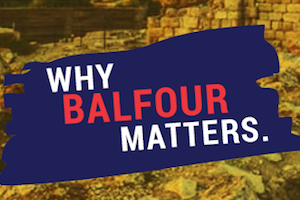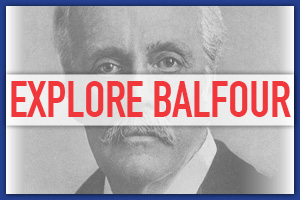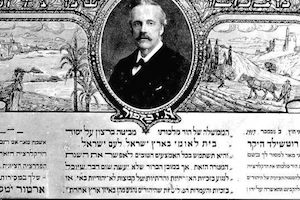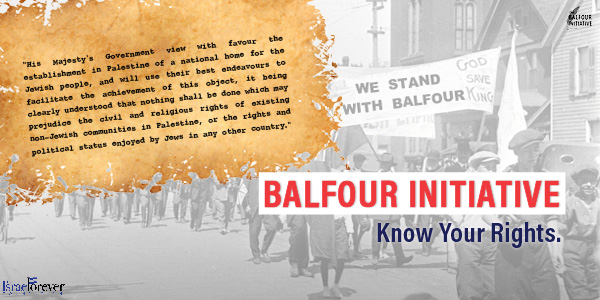Implementing The Balfour Declaration
By Alexander Zvielli, The Jerusalem Post
February 4, 2014

Balfour British coins
You won’t find this truth in the lengthy biography of Thomas Edward Lawrence, the legendary “Lawrence of Arabia” in the Encyclopaedia Britannica. Don’t expect to hear about this on the BBC. The world remembers Lawrence as a guide, friend and champion of Arabs, but hardly knows that he believed in Zionism as a force to restore Palestine to its ancient glory, brought about by active British-Jewish-Arab cooperation.
T.E. Lawrence, an English officer, an Arab hero, an archeologist, orientalist and author who, precisely because he was such a devoted champion of the Arab cause, supported the Jewish settlement in Palestine.
LAWRENCE, BORN on August 15, 1888, in Caernarvonshire, Wales, knew prewar Turkish-occupied Palestine much better than most European Zionist leaders, including Chaim Weizmann. Already at Oxford he had submitted a thesis on the subject of Crusader castles in France, Syria and Palestine, which won him first-class honors in history in 1910. As a protégé of Oxford archeologist D.G. Howard, he excavated from 1911 the Hittite settlement of Carchemish on the Euphrates.
Lawrence used his three-year scholarship to travel throughout Palestine, learning the language, customs and people. Early in 1914, he and Sir Leonard Woolley explored the northern Sinai extensively, in what was actually a strategic drawing and map-making of the Negev sponsored by the Palestine Exploration Fund. World War I found him in London as an expert on the Middle East and Arab affairs, employed in the map section of the War Office. Delegated to join the staff of the British HQ in Cairo, he persuaded the Arabs to revolt against the Turkish regime under the protection of British forces.
Lawrence, with his knowledge, experience and enthusiasm, and the aid of gold sovereigns, organized an Arab fighting unit commanded by Emir Feisal, son of Sherif Hussein of Mecca, to whom the British had addressed the McMahon Declaration of 1916 pledging the liberation of Arab countries from Turkish rule and support for Sherif Hussein as king.
Lawrence served Emir Feisal in this unit as a British liaison officer and political adviser, and was successful in capturing Aqaba in 1916. The unit entered Damascus in 1918. During the summer of 1918 it was still carrying out sabotage behind the Turkish lines when a historic meeting between Emir Feisal, Lawrence and Dr. Chaim Weizmann took place.
WEIZMANN RECALLS in his memoirs, published in his book Trial and Error, how he arrived in Cairo in the spring of 1918 as the head of the Zionist Commission, charged with advising the British Government on the implementation of the Balfour Declaration.
In Cairo, Weizmann was advised by General Edmund Allenby, the CO of British forces in Egypt, to try to make direct contact with the Arab leaders and seek their support for the common development of Palestine.
Allenby suggested Weizmann approach Emir Feisal “for a least a tentative agreement on the Zionist program for Palestine.” Feisal, in Allenby’s opinion, was the only Arab representative of influence, who could be regarded as the sole Arab leader.
Thus in June 1918, Weizmann, assisted by a British liaison officer, Major Ormsby- Gore, embarked on a difficult journey to meet Emir Feisal. However, on the way Ormsby-Gore became ill with dysentery.
Another British officer was appointed to accompany Weizmann to Feisal’s camp in Trans-Jordan. This unexpected substitution made Weizmann’s task all the more difficult, since Ormsby-Gore was sympathetic to Zionism.
It was a pleasant surprise to Weizmann, exhausted after a most tiring journey, when upon his arrival at Feisal’s camp he was greeted by Lawrence, friendly to the Zionist cause. Lawrence instructed Weizmann on how to approach Emir Feisal and how to present his cause, and proved himself to be not only a good translator, since Weizmann did not know Arabic, but a trusted friend who persuaded Feisal that the Jewish settlement in Palestine would be of great benefit to the country and the Arab people.
To Lawrence, who had met Jewish pioneers and admired their zeal, the formula of Jews and Arabs joined together under the British aegis in a common effort to rebuild Palestine after centuries of neglect, sounded most promising.
Lawrence, well aware of Palestinian poverty and neglect under Turkish rule, was convinced that Jewish effort and money would be of ultimate benefit to both peoples.
He presented this idea again after the end of World War I, when he served with the British delegation to the Paris Peace Conference and as a representative of Emir Feisal, representing Arab interests.
Lawrence assisted in the editing of the Weizmann-Feisal agreement by which the national and historic rights of Jews in Palestine were recognized. Britain was to become the trustee power in Palestine, expected to absorb millions of Jews who would extend financial and technical aid to the Arabs.
During the 1919 Paris Peace Conference, Lawrence was present at the crucial meeting between Emir Feisal and the American Zionist Felix Frankfurter. A historic letter was published on March 3, 1919, on behalf of the Hedjaz delegation, signed by Emir Feisal. The letter had clearly stated the Arab position:
“Dear Mr. Frankfurter, I want to take this opportunity of my first contact with American Zionists, to tell you what I have often been able to say to Dr. Weizmann in Arabia and Europe. We feel that the Arabs and Jews are cousins by race, suffering similar oppression at the hands of powers stronger than themselves, and by happy coincidence have been able to take first step towards the attainment of their national ideals together. We Arabs, especially the educated among us, look with the deepest sympathy on the Zionist movement...”
To read the full article, click here.








